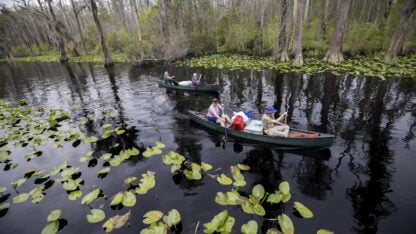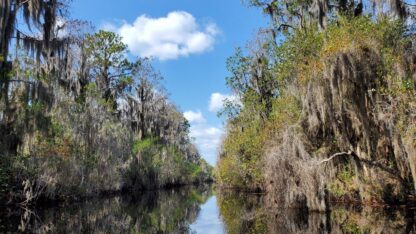This coverage is made possible through a partnership with WABE and Grist, a nonprofit, independent media organization dedicated to telling stories of climate solutions and a just future.
A bill to ban mining near the Okefenokee National Wildlife Refuge is still stalled in a state house committee after receiving a long-awaited hearing Tuesday. The bill was prompted by a proposal by Twin Pines Minerals to mine for titanium and other minerals near the refuge.
House Bill 71, the Okefenokee Protection Act, has attracted more than 90 sponsors from both sides of the aisle since January. But lawmakers just held their first hearing on the measure in the House Natural Resources and Environment’s Resource Management Subcommittee, a week after the deadline for bills to pass one chamber if they’re going to succeed this year.
The subcommittee did not vote on the bill.
Supporters and opponents of the bill each spoke for about an hour. Its author, Republican Representative Darlene Taylor, said the Okefenokee is too important to risk harming.
“It cannot be replaced,” she said of the National Wildlife Refuge. “A miscalculation cannot be corrected. The permanent damage to the entire ecosystem cannot be ruled out or fixed after it happens.”
The bill’s supporters expressed their concern that mining near the Okefenokee could harm the swamp – a place many Georgians love that also draws tourists from around the world.
Opponents of the bill echoed that love for Okefenokee. But they said a ban on mining would be an overreach.
“Let me explain why I won’t sign that bill: it walks all over private property rights,” said Republican John Corbett, who represents the area where the proposed mine would sit. “We’re taking somebody’s property and not compensating them.”
The bill would not seize or condemn private property, but it would ban one possible use of land along a geologic feature known as Trail Ridge, to the east of the Okefenokee.
The legislation would also not affect the currently proposed mine, but it would block future mining permits, including any expansions of the current footprint.
Supporters of the mine say it would bring much-needed jobs with minimal impact on the swamp.
“There’s no way we’d do anything to harm the swamp,” said Twin Pines president Steve Ingle in a video played during the hearing. “The mine will provide good-paying jobs in Charlton County and the surrounding areas.”
But many are skeptical the jobs would really go to locals, or last in the long term. They point out that the swamp itself attracts tourism dollars.
The state Environmental Protection Division is currently accepting public comment on the proposed mine.
A large number of scientists have come out against the mining proposal – more than 40 scientists signed a letter against it, and UGA hydrologist Rhett Jackson spoke against the mine at Tuesday’s hearing – because of concerns that disrupting the ground on Trail Ridge would affect the water level in the swamp.
Even a slight change in that water level would increase the frequency of drought and the likelihood of wildfires, according to Jackson.
Water modeling expert Sorab Panday of GSI Environmental, a consulting firm working for Twin Pines, pushed back against those concerns at the subcommittee hearing, stressing that the mine would only disrupt small areas at any given time. He argued the mine would only stand to change the swamp’s water level by a fraction of an inch, if at all.
Mine opponents have said even a minimal threat to the Okefenokee isn’t worth it.
“It would be a tremendous mistake to take this kind of risk,” said Cliff Oxford, an author and entrepreneur who grew up in Waycross, near the swamp. “I think Georgia would have a scar, not only in the swamp, but it would be a scar for this state forever.”
Although the subcommittee did not vote on the bill, Taylor remained optimistic. Because this is the first year of the two-year session, bills carry over to the next year.
“The bill is still alive,” she wrote in an email after the hearing. “It…can be heard and addressed next year.”
Taylor has also proposed a study committee to look into the issue of mining on Trail Ridge. A hearing on that proposal is expected in the Natural Resources Committee later this week.









